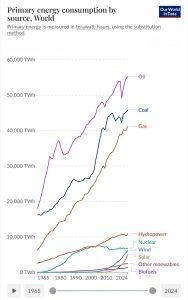🚨 Beware the ‘Primary Energy Fallacy’ 🚨
 Last week on LinkedIn, I saw a reasonably popular post featuring this graph (right). The only conclusion you could take, said the original poster (OP), was we had to “be honest with ourselves” about the timeframes for the energy transition as renewables were still delivering very little compared to fossil fuels.
Last week on LinkedIn, I saw a reasonably popular post featuring this graph (right). The only conclusion you could take, said the original poster (OP), was we had to “be honest with ourselves” about the timeframes for the energy transition as renewables were still delivering very little compared to fossil fuels.
Whoa, whoa, whoa!
The key word on the graph title is ‘primary’. Primary energy is the total energy going into the economy, not what utility is being extracted from that energy. A solar panel produces electricity; coal does nothing until you burn it, then it produces heat. If you want to turn that heat into electricity, then you start losing energy fast – you only get an average of 33-38% out of what you put in. So redraw that blue ‘coal’ line a factor of 2.5-3 times lower than currently on the graph and the useful energy produced is much closer to the renewables lines. Similarly with transport (an electric motor turns energy into motion much more efficiently than an internal combustion engine) and space heating (a heat pump is much more efficient than a gas boiler).
This is known as the ‘primary energy fallacy’ as it assumes all primary energy is equal when it isn’t: you can charge your phone with a solar panel, but not with a lump of coal.
The OP replied to my explanation of the above in the comments to say “we shouldn’t get hung up on the shape of the curves” but that “we still need coal to power all those EVs”, ie conceding his argument was bobbins but sticking to the guns with his conclusion (that’s what we call confirmation bias). But the UK has no coal in the energy mix, a fast rising number of EVs and no black outs. When I checked his profile, I saw his company made ‘green cement’ using ash from, wait for it, coal-fired power plants. So his argument is a form of ‘predatory delay’: please don’t phase out coal until I’ve finished making money from the by-products.
This was far from the most stupid take on renewable energy last week: someone else linked to an article complaining that you couldn’t make products from renewable energy, the way you could make plastics, pharmaceuticals etc from oil. Therefore, ran the argument, depending on renewables would take us back to pre-industrial times, ravaged by disease as we couldn’t make vaccines etc.
Eh?
This is like complaining that your cat can’t do maths, so having a cat means you can’t use a calculator. Did someone get paid to come up with such guff? (Answer: quite probably – and for the wrong reasons.) The point of the energy transition is to stop burning fossil fuels, not to stop making other products from them. [Of course removing fuels from the petrochemical mix would change the economics of the sector, but that in turn may favour circular economy business models over making disposable plastic tat.]
I call this the ‘perfection fallacy’ and you see it all the time: “you can’t move a sofa on a bicycle” (you can’t fit a sofa in an average family car either – use a van for that very occasional job, and a bike for popping to the shops), “not everybody can ride a bike” (not everybody can drive a car, ask my 15 year old), “how do you make cement with renewables?” (with difficulty, but only a small % of global emissions – do the easy bits first).
My frustration is you see these fallacies all the time, from supposedly educated people, yet so many other people just read, nod and go “yup, common sense”. I’m increasingly finding the phrase ‘common sense’ is code for “something made up that makes me feel comfortable doing/thinking what I do/think every day.”

